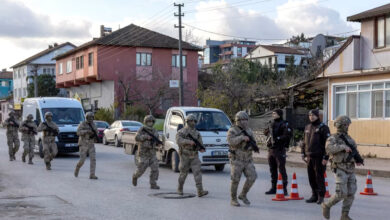
ISTANBUL, Oct 23 (Reuters) – Turkish President Tayyip Erdogan said on Saturday that he had told his foreign ministry to expel the ambassadors of the United States and nine other Western countries for demanding the release of philanthropist Osman Kavala.
Seven of the ambassadors represent Turkey’s NATO allies and the expulsions, if carried out, would open the deepest rift with the West in Erdogan’s 19 years in power.
Kavala, a contributor to numerous civil society groups, has been in prison for four years, charged with financing nationwide protests in 2013 and with involvement in a failed coup in 2016. He has remained in detention while his latest trial continues, and denies the charges.
In a joint statement on Oct. 18, the ambassadors of Canada, Denmark, France, Germany, the Netherlands, Norway, Sweden, Finland, New Zealand and the United States called for a just and speedy resolution to Kavala’s case, and for his “urgent release”. They were summoned by the foreign ministry, which called the statement irresponsible.
“I gave the necessary order to our foreign minister and said what must be done: These 10 ambassadors must be declared persona non grata (undesirable) at once. You will sort it out immediately,” Erdogan said in a speech in the northwestern city of Eskisehir.
“They will know and understand Turkey. The day they do not know and understand Turkey, they will leave,” he said to cheers from the crowd.
The U.S. and French embassies and the White House did not immediately respond to requests for comment. A U.S. State Department spokesperson said it was aware of the reports and was seeking clarity from the Turkish Ministry of Foreign Affairs.
Erdogan has said previously that he plans to meet U.S. President Joe Biden at a summit of the Group of 20 (G20) major economies in Rome next weekend. read more
One diplomatic source said de-escalation was possible given Turkey has now made its stance very clear, and given the potential diplomatic fallout from such a move ahead of the G20 summit and the U.N. climate summit in Glasgow starting at the end of the month.
“No instructions have been given to embassies,” the source said, adding that it was possible a decision may be taken at Turkey’s cabinet meeting on Monday.
Norway said its embassy had not received any notification from Turkish authorities.
“Our ambassador has not done anything that warrants an expulsion,” said the ministry’s chief spokesperson, Trude Maaseide, adding that Turkey was well aware of Norway’s views.
“We will continue to call on Turkey to comply with democratic standards and the rule of law to which the country committed itself under the European Human Rights Convention,” Maaseide said.




